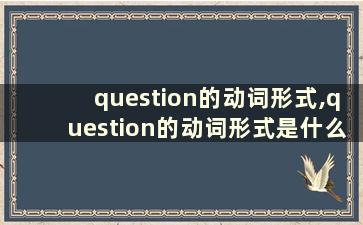question的动词形式,question的动词形式是什么

Question的动词形式是什么?
在英语中,动词形式的变化是非常常见的。动词的不同形式可以用来表达不同的时态、人称和语态等。我们将探讨question这个词的动词形式,并深入了解其用法和意义。通过对question的动词形式的详细阐述,我们将帮助读者更好地理解和运用这个词。
背景信息:
Question是一个名词,表示疑问、问题或询问的行为。它也可以作为动词使用,表示提问或质疑。在动词形式中,question可以发生一些变化,以适应不同的语境和语法规则。
question的一般现在时形式
一般现在时的肯定句
一般现在时的肯定句形式是“主语 + question + 其他成分”。例如:“I question his motives.”(我质疑他的动机。)
一般现在时的否定句
一般现在时的否定句形式是“主语 + do not/does not + question + 其他成分”。例如:“She does not question their decisions.”(她不质疑他们的决定。)
一般现在时的疑问句
一般现在时的疑问句形式是“Question + 主语 + 其他成分?”例如:“Question she their methods?”(她质疑他们的方法吗?)
question的一般过去时形式
一般过去时的肯定句
一般过去时的肯定句形式是“主语 + questioned + 其他成分”。例如:“He questioned her decision.”(他质疑了她的决定。)
一般过去时的否定句
一般过去时的否定句形式是“主语 + did not + question + 其他成分”。例如:“They did not question his authority.”(他们没有质疑他的权威。)
一般过去时的疑问句
一般过去时的疑问句形式是“Did + 主语 + question + 其他成分?”例如:“Did she question their motives?”(她质疑了他们的动机吗?)
question的进行时形式
进行时的肯定句
进行时的肯定句形式是“主语 + am/is/are + questioning + 其他成分”。例如:“I am questioning the validity of their argument.”(我正在质疑他们的论点的有效性。)
进行时的否定句
进行时的否定句形式是“主语 + am not/is not/are not + questioning + 其他成分”。例如:“She is not questioning his intentions.”(她没有质疑他的意图。)
进行时的疑问句
进行时的疑问句形式是“Am/Is/Are + 主语 + questioning + 其他成分?”例如:“Are they questioning the results?”(他们正在质疑结果吗?)
question的完成时形式
完成时的肯定句
完成时的肯定句形式是“主语 + have/has + questioned + 其他成分”。例如:“We have questioned their motives.”(我们已经质疑了他们的动机。)
完成时的否定句
完成时的否定句形式是“主语 + have/has not + questioned + 其他成分”。例如:“He has not questioned the validity of the evidence.”(他没有质疑证据的有效性。)
完成时的疑问句
完成时的疑问句形式是“Have/Has + 主语 + questioned + 其他成分?”例如:“Have you questioned their decisions?”(你质疑了他们的决定吗?)
question的被动语态形式
被动语态的肯定句
被动语态的肯定句形式是“主语 + am/is/are + questioned + 其他成分”。例如:“The decision is being questioned by many people.”(这个决定正受到很多人的质疑。)
被动语态的否定句
被动语态的否定句形式是“主语 + am not/is not/are not + questioned + 其他成分”。例如:“Their actions are not being questioned by the authorities.”(他们的行动没有受到当局的质疑。)
被动语态的疑问句
被动语态的疑问句形式是“Am/Is/Are + 主语 + questioned + 其他成分?”例如:“Is the decision being questioned by the public?”(这个决定正受到公众的质疑吗?)
question的情态动词形式
情态动词can的肯定句
情态动词can的肯定句形式是“主语 + can + question + 其他成分”。例如:“You can question their authority.”(你可以质疑他们的权威。)
情态动词can的否定句
情态动词can的否定句形式是“主语 + cannot + question + 其他成分”。例如:“She cannot question the validity of the evidence.”(她无法质疑证据的有效性。)
情态动词can的疑问句
情态动词can的疑问句形式是“Can + 主语 + question + 其他成分?”例如:“Can he question their decisions?”(他可以质疑他们的决定吗?)
question的其他动词形式
除了以上介绍的动词形式外,question还可以与其他动词形式结合使用,如进行时的完成形式、完成时的进行形式等。这些形式的具体用法和意义需要根据具体语境来确定。
通过对question的动词形式的详细阐述,我们了解到了其在不同时态和语态下的变化形式。无论是一般现在时、一般过去时、进行时还是完成时,question都能够灵活运用。我们还了解到了question与情态动词的搭配使用,以及其他动词形式的结合。掌握这些动词形式,将有助于我们更准确地表达自己的意思,并理解他人的提问和质疑。
建议:
在实际应用中,我们应该根据具体语境和需要选择合适的动词形式。我们还可以进一步研究question的动词形式在不同语境中的使用频率和意义变化,以便更好地理解和运用这个词。未来的研究可以探讨question的动词形式在口语和书面语中的差异,以及不同地区和文化背景下的用法差异。通过这些研究,我们可以更全面地了解和掌握question的动词形式的用法和意义。
本文由李青候发布,不代表东辰网立场,转载联系作者并注明出处:https://www.ktwxcd.com/bkzs/263158.html

